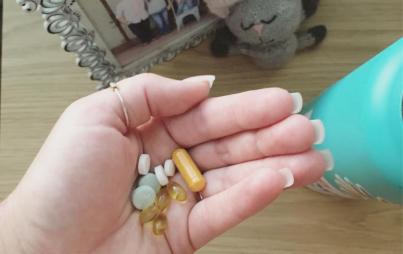
Depression can be mild or intense, and depression can result from a physical, emotional, or environmental dilemma or a combination of of these factors.
This article first appeared on Your Tango and has been republished with permission.
It's really hard to watch a loved one be sad and not like their life. You may feel helpless while they keep doing nothing about it, while you sit around wondering how to help them deal with their depression.
Here are some questions to ask someone who is depressed that could help both of you pinpoint what the heck is going on and if there is something to be done about it. However, keep in mind that, as with everything else, it's ultimately up to them.
According to the Mayo Clinic, depression is "a mood disorder that causes a persistent feeling of sadness and loss of interest. Also called major depressive disorder or clinical depression, it affects how you feel, think and behave and can lead to a variety of emotional and physical problems. You may have trouble doing normal day-to-day activities, and sometimes you may feel as if life isn't worth living. [ ...] More than just a bout of the blues, depression isn't a weakness and you can't simply 'snap out' of it. Depression may require long-term treatment."
You Might Also Like: Stop Thinking You Understand Depression
There are all kinds of depressions, from mild to pretty intense, and depression can result from a physical, emotional, or environmental dilemma or a combination of of these factors.
If you want to know how to help someone who is depressed, here are 6 questions to ask and what to say to someone dealing with depression.
1. "What are you eating these days?"
Recent research identifies the physiological causes of depression as sometimes originating in the gut.
Serotonin is one of the chemicals (neurotransmitters) that gives people a relaxed and happy feeling. Ninety-five percent of your serotonin is located in your gut, the rest in the brain. So when your gut is happy and healthy, so are you.
2. "Have you had a physical lately?"
Depression can also be part of physical health struggles, such as thyroid or other hormonal imbalances, pain, autoimmune diseases, drug or alcohol use, and more.
3. "What's been going on in your life lately?"
In addition to physical origins of depression, sometimes life brings environmental challenges that get a person down. Something happens and instead of grieving, they can become depressed.
Asking this type of question might help draw out any circumstantial problems that could be contributing to their pain, like the death of a loved one, problems at work, or money issues.
4. "What do you think is making you feel so bad right now?"
Emotional causes can also be to blame for the onset of depression. Sometimes past events in a person's life can still be alive in their mind or body. Even though they may have no idea what's making them depressed, those events could be affecting the person you love under the surface of their awareness.
5. "Want to talk? I'm here to listen."
Asking questions about the reasons someone feels depressed is a start, but often, what someone needs most isn't your help finding the cause, but rather it's your presence they need most.
Imagine someone in a deep dark hole, sluggish, not much energy physically or emotionally, not much motivation to change things. Stuck.
A willing, caring, non-judgmental ear. Someone to listen so you can pour out your troubles without necessarily wanting advice.
If your loved one can't even bear to talk, ask if you can just sit with them. Or, if they prefer to be alone, you can say, "I'm here when you're ready."
While you're at it, ask yourself some questions, too:
Do you need them to answer your questions because you're worried and you want to get them out of their space, so you'll feel better?
If so, take a breath, and back off while you wait with them. Try to restrain yourself from giving advice that's not asked for or peppering them with a lot of questions. That will probably turn them off and push them away from you.
When you say things like, "Sounds really hard," or "I can imagine it sucks," or your own version of empathy, folks feel heard.
You give them a gift when you accept them where they are. And sometimes your presence and care is the key to unlock that stuck place.
If someone is seriously depressed they may need professional intervention.
If the person you love never gets out of bed, hoards pills (or has another way to self-harm), never eats, sleeps poorly or too much, self medicates, or shows signs of other self-destructive behavior, it may be time to take action. Call doctors, hospitals, mental health services to get advice on what to do next.
Finally, the ultimate question to ask someone struggling with depression is this ...
6. "Are you willing to get some help?"
If they say, "Yes," find out what you can do to assist or support them in getting the help they need.
Thank you for caring! Depression is not something to be scared of. We all may feel that way one time or another.
The fact that you're willing to ask questions of a loved one who feels down is amazing. You care, and that is the biggest gift!








